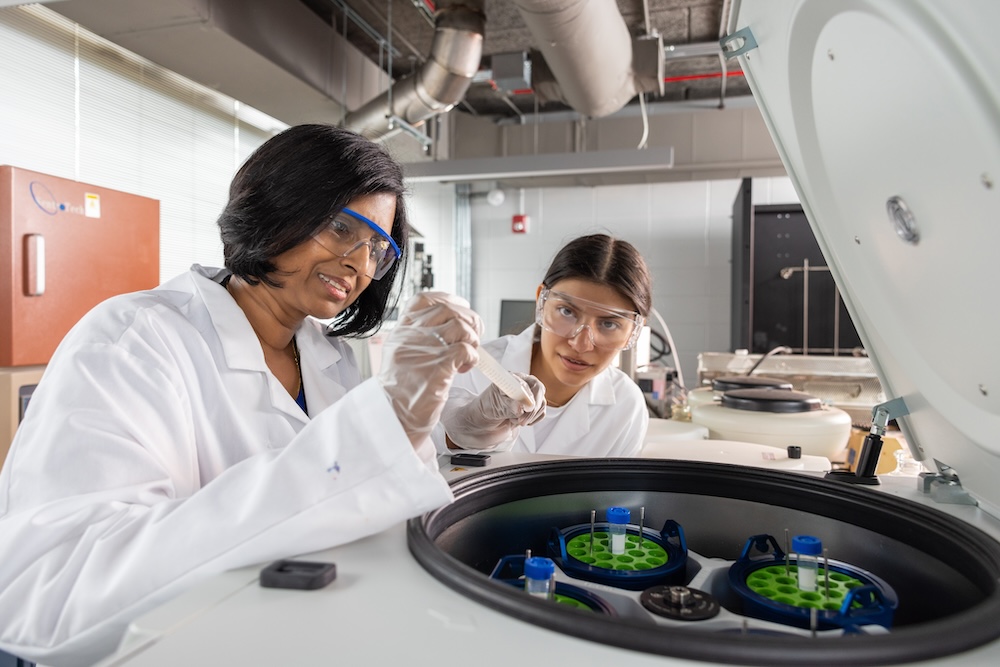

KENNESAW, Ga. | Aug 19, 2024

The junior from Smyrna said classes in astronomy and physics taught her how physical forces effect everything around her, and she wanted to immerse herself in them. So, she came to Kennesaw State University for the opportunity to conduct research right away as a freshman.
“Honestly, the research opportunities drew me to KSU,” said Manqueros, who is pursuing a bachelor’s degree in physics in Kennesaw State’s College of Science and Mathematics. “Other colleges mainly take graduate students for their research, and I knew that at KSU I could do meaningful research even if I was an undergraduate student.”
That desire for meaningful research drew her to the lab of professor Kisa Ranasinghe, who creates bioactive glass that can transport nanoparticles that treat various ailments. Manqueros approached Ranasinghe at an early-semester meeting for physics majors after hearing the professor discuss her work; Manqueros was hooked, and Ranasinghe was impressed.
“When someone stops me to say they’re interested in my research and want to learn more, that’s an indicator, right?” Ranasinghe said. “For a freshman to take that initiative and show that amount of enthusiasm is truly impressive. Very quickly I found out she has great potential.”
From that day forward, Manqueros poured herself into the life-changing research into bioglass, which isn’t really glass but a conduit that acts like glass to bring therapeutic nanoparticles into the body. Manqueros said cerium oxide nanoparticles within the bioglass can interact to treat Alzheimer’s disease, cancer, diabetes, and other physical and neurological conditions. The first part of her explanation, though, involves demystifying the idea of glass in the body.
“A lot of times when we say we're doing research on glass that we can put into your body, people freak out because they imagine the glass breaking — it’s not like that,” she explained. “The simple fact that we work with glass to better people's health — that's something that I really want to get across to people. What we do from the physics point of view is study those nanoparticles and how they interact within the glass.”
Manqueros investigated these problems as a Birla Carbon Scholar this summer. She also has been the lead author on an abstract for a poster presentation that published earlier this year in the Georgia Journal of Science, and she presented findings at the Georgia Academy of Science conference in March, where she won first prize for undergraduate oral presentations in the division that covers physics, mathematics, computer science, and engineering.
Ranasinghe said Manqueros’ future is wide-open, though Manqueros said the future will involve more physics, either a master’s degree or a doctorate while continuing the research into bioglass. Life-changing research with societal impact will keep her engaged for a long time to come, she said.
“I actually enjoy what I do,” she said. “Oftentimes when you're doing work as a physicist, people don't see the meaning in what you do because they wonder why we need to study this. This research is impacting anyone who has some sort of disease or wants to improve their health or their body. I like that I have a direct impact on people's lives through the research that I do here at KSU.”
– Story by Dave Shelles
Photos by Matt Yung
A leader in innovative teaching and learning, Kennesaw State University offers undergraduate, graduate, and doctoral degrees to its more than 51,000 students. Kennesaw State is a member of the University System of Georgia with 11 academic colleges. The university's vibrant campus culture, diverse population, strong global ties, and entrepreneurial spirit draw students from throughout the country and the world. Kennesaw State is a Carnegie-designated doctoral research institution (R2), placing it among an elite group of only 8 percent of U.S. colleges and universities with an R1 or R2 status. For more information, visit kennesaw.edu.